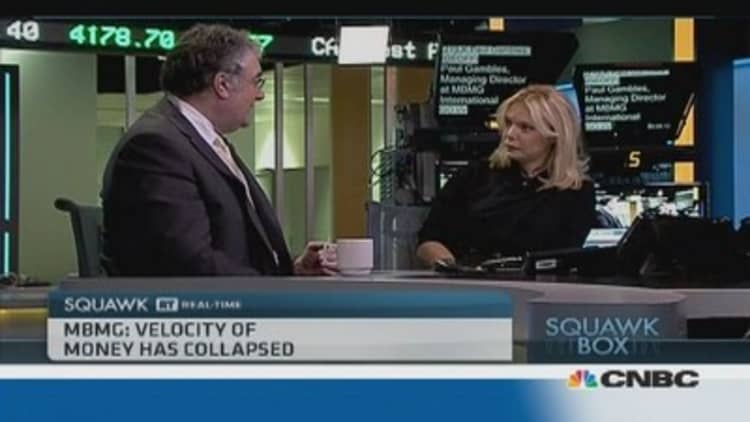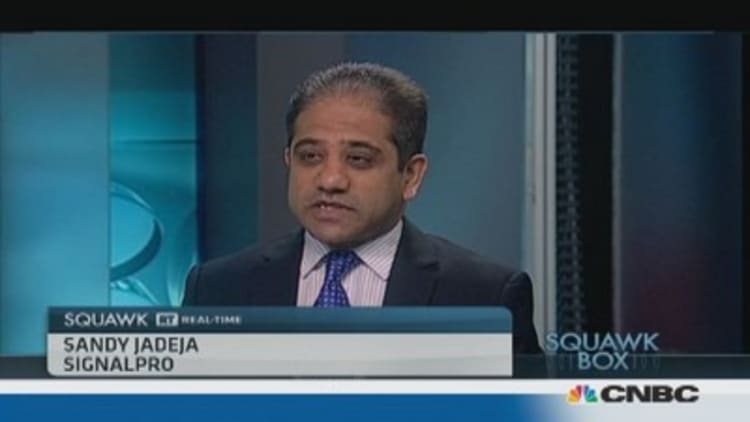
Growth figures of 4.1 percent can't hide the weak fundamentals in the U.S., analysts have warned CNBC, who have predicted an American recession in 2014 and a pullback of 30 percent on the Dow Jones Industrial Average.
Paul Gambles, managing partner at advisory firm MBMG International believes investors would be very brave to "chase the rally" as the extra funds provided by central banks have meant more and more retail investors have joined the move upwards.
"It looks like 1937 to me. We get a pullback because we have to get a pullback, we can't keep this stimulus going, it's stopped working. It's actually having a negative effect on the real economy now and the Fed can see that," he told CNBC Friday.
(Read More: 'Massive correction' for stocks and Treasurys in 2014)
"(While) we've got a debt problem that's unaddressed. And (while) we've got a badly underperforming real economy, then expensive assets are not really a good place to be...I think it's more than likely that we're going to see a recession anyway in the States in the first half of 2014."
Gambles uses underlying economic fundamentals for his predictions. Third-quarter gross domestic product for the U.S. beat market expectations with a reading of 3.6 percent on an annualized basis. Data this week also showed that U.S. housing starts surged to their highest in nearly six years in November, pointing to a modest recovery.
"All the real fundamental economic data, if we ignore the headline official stats, that's painting a pretty horrible picture of wages and employment in the States," he said.

(Read More: US recession is nigh...and the Fed can't stop it: SocGen bear)
Housing starts data is akin to a "dead-cat bounce", he said, meaning that any recovery since the financial crash has been brief. "This (cat) seems to be wearing concrete around its neck because the bounce has been so limited. Housing in the States is actually in a desperate condition at the moment," he said.
Recent employment data has also hidden some rather worrying truths. The labor-force participation rate for October, a measure of both people who are working and those who are actively looking, fell by 40 basis points to 62.8 percent, its lowest level in more than three decades. The 30-year average stands at around 65.8 percent.
"While we've got such high unemployment, whether it's people not wanting to participate or feeling disenfranchised from labor force, while we've got such wage constraints, I can't see any way that we get sustainable growth," Gambles said.
The Dow Jones has been on a tear this year with gains of 20 percent on the start of the year, reaching a record high of 16,179 points at the close on Thursday. The S&P 500 has rallied 27 percent year-to-date and the Nasdaq 100 Index has logged gains of 31 percent. Aggressive bond-buying by the U.S. Federal Reserve is seen by many as the reason behind the move higher. With the Fed starting to "taper" purchases by $10 billion next month, investors believe this could coincide with a pullback.
"From a technical picture I'm actually quite concerned going into 2014 and I think we're going to see a very sharp selloff...I think we're going to see the (Dow Jones) shave off 4,700 points. It may not do it in 2014 all in one go," Sandy Jadeja, chief market strategist at SignalPro told CNBC.
The two key months for Jadeja will be January and March next year, he said. Looking at technical analysis and studying long-term and short-term cycles he believes that three different factors are "converging" and painting a very dark picture for 2014.
(Read More: Stand by…a hefty drop's on the way: Nomura's Janjuah)
The long term 84-year cycle, dating back to the 1930s recession and the short term 15-year cycle both point to December 2013, he added, expecting more retail traders to pile into equities before seeing "the turn". His advice? Jadeja expects there to be a rotation from hard commodities into soft commodities with food being an interesting sector for investors to look into.
Whether its fundamentals or technical analysis, Gambles and Jadeja are not alone with their concerns. Bob Janjuah, Nomura's uber-bearish strategist, believes a hefty dip in global stock markets is just around the corner, predicting that in the last nine months of 2014 stocks will lose between a quarter and half of their value.
Kit Juckes, global head of foreign exchange strategy at Societe Generale said in his 2014 predictions on Thursday that he expects the S&P to initially rally after the Fed "tapered" its bond purchases, but for this to quickly reverse by the middle of 2014.
— CNBC.com's Matt Clinch. Follow him on Twitter @mattclinch81





